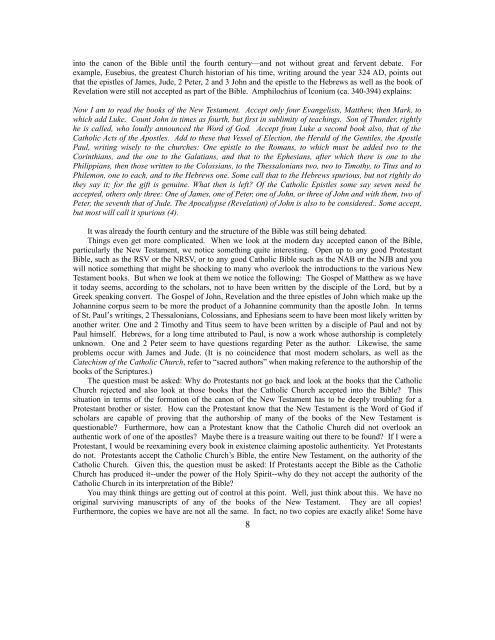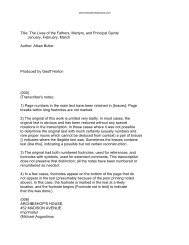Ecce Fides - Pillar of Truth - St. Patrick's Basilica
Ecce Fides - Pillar of Truth - St. Patrick's Basilica
Ecce Fides - Pillar of Truth - St. Patrick's Basilica
You also want an ePaper? Increase the reach of your titles
YUMPU automatically turns print PDFs into web optimized ePapers that Google loves.
into the canon <strong>of</strong> the Bible until the fourth century—and not without great and fervent debate. For<br />
example, Eusebius, the greatest Church historian <strong>of</strong> his time, writing around the year 324 AD, points out<br />
that the epistles <strong>of</strong> James, Jude, 2 Peter, 2 and 3 John and the epistle to the Hebrews as well as the book <strong>of</strong><br />
Revelation were still not accepted as part <strong>of</strong> the Bible. Amphilochius <strong>of</strong> Iconium (ca. 340-394) explains:<br />
Now I am to read the books <strong>of</strong> the New Testament. Accept only four Evangelists, Matthew, then Mark, to<br />
which add Luke. Count John in times as fourth, but first in sublimity <strong>of</strong> teachings. Son <strong>of</strong> Thunder, rightly<br />
he is called, who loudly announced the Word <strong>of</strong> God. Accept from Luke a second book also, that <strong>of</strong> the<br />
Catholic Acts <strong>of</strong> the Apostles. Add to these that Vessel <strong>of</strong> Election, the Herald <strong>of</strong> the Gentiles, the Apostle<br />
Paul, writing wisely to the churches: One epistle to the Romans, to which must be added two to the<br />
Corinthians, and the one to the Galatians, and that to the Ephesians, after which there is one to the<br />
Philippians, then those written to the Colossians, to the Thessalonians two, two to Timothy, to Titus and to<br />
Philemon, one to each, and to the Hebrews one. Some call that to the Hebrews spurious, but not rightly do<br />
they say it; for the gift is genuine. What then is left? Of the Catholic Epistles some say seven need be<br />
accepted, others only three: One <strong>of</strong> James, one <strong>of</strong> Peter, one <strong>of</strong> John, or three <strong>of</strong> John and with them, two <strong>of</strong><br />
Peter, the seventh that <strong>of</strong> Jude. The Apocalypse (Revelation) <strong>of</strong> John is also to be considered.. Some accept,<br />
but most will call it spurious (4).<br />
It was already the fourth century and the structure <strong>of</strong> the Bible was still being debated.<br />
Things even get more complicated. When we look at the modern day accepted canon <strong>of</strong> the Bible,<br />
particularly the New Testament, we notice something quite interesting. Open up to any good Protestant<br />
Bible, such as the RSV or the NRSV, or to any good Catholic Bible such as the NAB or the NJB and you<br />
will notice something that might be shocking to many who overlook the introductions to the various New<br />
Testament books. But when we look at them we notice the following: The Gospel <strong>of</strong> Matthew as we have<br />
it today seems, according to the scholars, not to have been written by the disciple <strong>of</strong> the Lord, but by a<br />
Greek speaking convert. The Gospel <strong>of</strong> John, Revelation and the three epistles <strong>of</strong> John which make up the<br />
Johannine corpus seem to be more the product <strong>of</strong> a Johannine community than the apostle John. In terms<br />
<strong>of</strong> <strong>St</strong>. Paul’s writings, 2 Thessalonians, Colossians, and Ephesians seem to have been most likely written by<br />
another writer. One and 2 Timothy and Titus seem to have been written by a disciple <strong>of</strong> Paul and not by<br />
Paul himself. Hebrews, for a long time attributed to Paul, is now a work whose authorship is completely<br />
unknown. One and 2 Peter seem to have questions regarding Peter as the author. Likewise, the same<br />
problems occur with James and Jude. (It is no coincidence that most modern scholars, as well as the<br />
Catechism <strong>of</strong> the Catholic Church, refer to “sacred authors” when making reference to the authorship <strong>of</strong> the<br />
books <strong>of</strong> the Scriptures.)<br />
The question must be asked: Why do Protestants not go back and look at the books that the Catholic<br />
Church rejected and also look at those books that the Catholic Church accepted into the Bible? This<br />
situation in terms <strong>of</strong> the formation <strong>of</strong> the canon <strong>of</strong> the New Testament has to be deeply troubling for a<br />
Protestant brother or sister. How can the Protestant know that the New Testament is the Word <strong>of</strong> God if<br />
scholars are capable <strong>of</strong> proving that the authorship <strong>of</strong> many <strong>of</strong> the books <strong>of</strong> the New Testament is<br />
questionable? Furthermore, how can a Protestant know that the Catholic Church did not overlook an<br />
authentic work <strong>of</strong> one <strong>of</strong> the apostles? Maybe there is a treasure waiting out there to be found? If I were a<br />
Protestant, I would be reexamining every book in existence claiming apostolic authenticity. Yet Protestants<br />
do not. Protestants accept the Catholic Church’s Bible, the entire New Testament, on the authority <strong>of</strong> the<br />
Catholic Church. Given this, the question must be asked: If Protestants accept the Bible as the Catholic<br />
Church has produced it--under the power <strong>of</strong> the Holy Spirit--why do they not accept the authority <strong>of</strong> the<br />
Catholic Church in its interpretation <strong>of</strong> the Bible?<br />
You may think things are getting out <strong>of</strong> control at this point. Well, just think about this. We have no<br />
original surviving manuscripts <strong>of</strong> any <strong>of</strong> the books <strong>of</strong> the New Testament. They are all copies!<br />
Furthermore, the copies we have are not all the same. In fact, no two copies are exactly alike! Some have<br />
8






